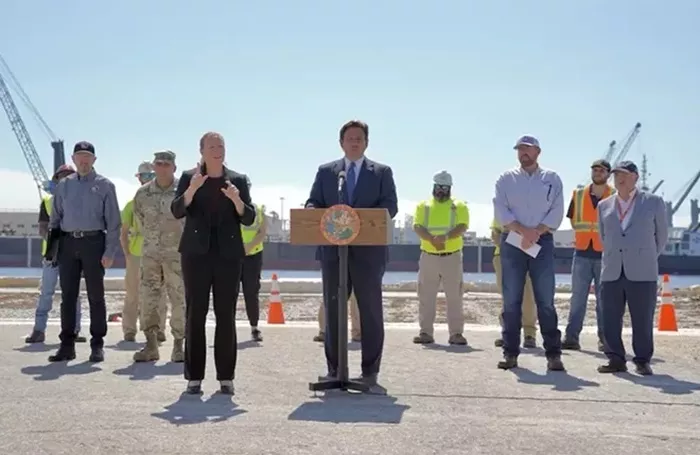Governor Ron DeSantis on Monday said that a legal loophole and the reluctance of gas station owners to use generators contributed to Florida’s widespread fuel shortages in the aftermath of Hurricane Milton.
The powerful storm knocked out electricity across much of the state, leaving many gas stations unable to pump fuel. While ports were closed and supply chains stalled, the state deployed mobile fuel stations and sent state troopers to escort fuel tankers to operational locations.
Speaking at SeaPort Manatee, DeSantis said the current law intended to keep gas stations functioning during emergencies might need to be reviewed. The law requires gas stations built after 2006 along evacuation routes to be compatible with electric generators. However, it does not require each station to have a generator on-site. Instead, companies that own 10 or more gas stations in a county must have one portable generator for every 10 locations.
DeSantis pointed out that the law contains a loophole. “The law was written in a way that allows some operators to avoid the requirement if they structure their operations in a certain way,” he said.
As a result, many gas stations that could have accepted generator power remained offline unless the state delivered a generator. According to the Florida Phoenix, 19 generators were distributed to stations on Friday.
Even when generators were available, some station owners chose not to use them. DeSantis said some operators expected the power to return within 48 hours and chose to wait. “By the time you bring in a generator and connect it, the grid power might come back on anyway,” he said.
He added that with pre-positioned utility workers ready to restore service, some businesses may have found it more cost-effective to wait than manage generator use.
DeSantis said the state might take action to close the loophole, but he also expressed caution. “We’ll look at the generator issue,” he said. “But how much should the state mandate versus working collaboratively? I don’t think mandating everything is always the best solution.”
He also noted that fuel distribution is primarily a private-sector responsibility. “We’re not Venezuela,” he said.
To help meet immediate fuel needs, the state offered free gasoline — up to 10 gallons per vehicle — at designated distribution sites until 7 p.m. Monday. These sites included Bradenton, Plant City, St. Petersburg, Arcadia, Port Charlotte, North Port, Tarpon Springs, Tampa, Port Richey, Wesley Chapel, and Largo.
“We have fuel for the public,” DeSantis said. “We’re not even charging. Free gas — imagine that. Helps to have a budget surplus.”
State Provides $9.5 Million to Support SeaPort Manatee Recovery
During the same press conference, DeSantis announced a $9.5 million award to help SeaPort Manatee recover from storm damage. The funds are aimed at repairing critical infrastructure and restoring port operations.
Of the total, $5.5 million will go toward emergency repairs to berths and dredging in state-controlled waters. Another $3.5 million will cover urgent security needs. The remaining $500,000 will be used for planning additional upgrades to strengthen the port’s defenses against future storms.
The Florida Department of Transportation and the Florida National Guard will assist with the recovery efforts. Subject matter experts from both agencies will support the port’s rebuilding process.
Kevin Guthrie, Director of the Florida Division of Emergency Management, said that the Federal Emergency Management Agency (FEMA) will reimburse the state for some of the costs, though not all.
DeSantis said the state’s investment in SeaPort Manatee will bring long-term economic benefits. “Every dollar we put into these projects will return about $7,” he said. “We’re happy to support the port, and this funding will make a real difference.”
He added that additional support efforts beyond state involvement are also expected in the weeks ahead.

